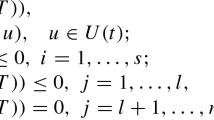Abstract
A necessary condition of optimality—the variational maximum principle—for continuous dynamic optimization problems under linear unbounded control and trajectory terminal constraints is studied. It holds for optimal control problems, which are characterized by the commutativity of vector fields corresponding to the components of a linear control in the dynamic system (Frobenius-type condition). For these problems, the variational maximum principle, being a first-order necessary condition of optimality, is a stronger version of the Pontryagin maximum principle. Examples are given.
Similar content being viewed by others
REFERENCES
Pontryagin, L.S., Boltyanskii, V.G., Gamkrelidze, R.V., et al., Matematicheskaya teoriya optimal'nykh protsessov (Mathematical Theory of Optimal Processes), Moscow: Fizmatgiz, 1961.
Zavalishchin, S.T. and Sesekin, A.N., Impul'snye protsessy: modeli i prilozheniya (Pulse Processes: Models and Applications), Moscow: Nauka, 1991.
Gurman, V.I., Vyrozhdennye zadachi optimal'nogo upravleniya (Singular Optimal Control Problems), Moscow: Nauka, 1985.
Dykhta, V.A. and Samsonyuk, O.N., Optimal'noe impul'snoe upravlenie s prilozheniyami (Optimal Pulse Control with Applications), Moscow: Fizmatlit, 2000.
Dykhta, V.A., A Variational Maximum Principle for Pulse and Singular Modes in Linear Control Optimization, Izv. Vuzov. Mat., 1991, no. 11, pp. 89–91.
Dykhta, V.A., The Variational Maximum Principle and Quadratic Optimality Conditions for Pulse and Singular Processes, Sib. Mat. Zh., 1994, vol. 35, no. 1, pp. 70–82.
Dykhta, V.A., Variatsionnyi printsip maksimuma i kvadratichnye usloviya optimal'nosti impul'snykh protsessov (The Variational Maximum Principle and Quadratic Optimality Conditions for Pulse Processes), Irkutsk: IGEA, 1995.
Cartan, H., Calcul différentiel. Formes différentielles., Paris: Hermann, 1967. Translated under the title Differentsial'noe ischislenie. Differentsial'nye formy, Moscow: Mir, 1971.
Dykhta, V.A., Local Minimum Conditions for Singular Modes in Linear Control Systems, Avtom. Telemekh., 1981, no. 12, pp. 5–10.
Goh, B.S., Optimal Singular Control for Multi-Input Linear Systems, J. Math. Anal. Appl., 1967, vol. 20, no. 3, pp. 534–539.
Gurman, V.I., Printsip rasshireniya v zadachakh optimal'nogo upravleniya (The Extension Principle in Optimal Control Problems), Moscow: Nauka, 1985.
Dykhta, V.A., Pulse Optimal Control in Economic and Quantum Electronic Models, Avtom. Telemekh., 1999, no. 11, pp. 100–113.
Dykhta, V.A., Kolokol'nikova, G.A., and Nikiforova, I.A., Nonlocal Transformations of Optimal Control Problems and Minimum Conditions on a Set of Sequences in Problems with Singular Modes, in Teoreticheskie i prikladnye voprosy optimal'nogo upravleniya (Theoretical and Applied Aspects of Optimal Control), Novosibirsk: Nauka, 1985, pp. 59–75.
Gabasov, R. and Kirillova, F.M., Osobye optimal'nye upravleniya (Singular Optimal Controls), Moscow: Nauka, 1973.
Milyutin, A.A. and Osmolovskii, N.P., Calculus of Variations and Optimal Control, Providence: Am. Math. Soc., 1998.
Author information
Authors and Affiliations
Rights and permissions
About this article
Cite this article
Dykhta, V.A. A Variational Maximum Principle for Classical Optimal Control Problems. Automation and Remote Control 63, 560–567 (2002). https://doi.org/10.1023/A:1015169929684
Issue Date:
DOI: https://doi.org/10.1023/A:1015169929684




